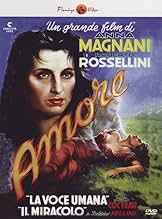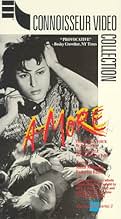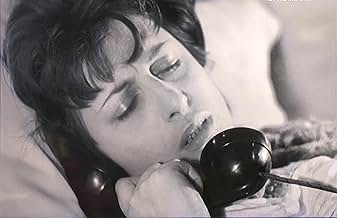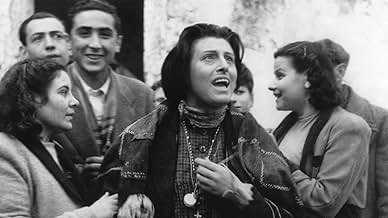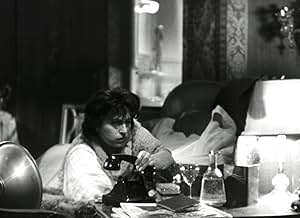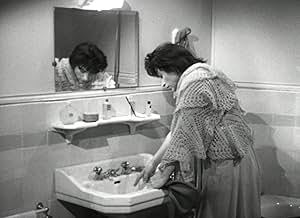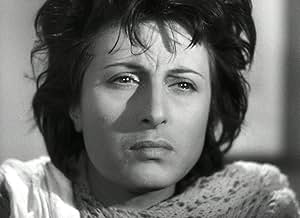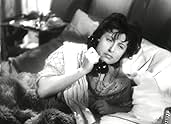IMDb RATING
6.9/10
2.1K
YOUR RATING
In part one, a heartbroken woman talks to her ex-lover on the phone. In part two, a pregnant woman believes she is carrying the child of Saint Joseph.In part one, a heartbroken woman talks to her ex-lover on the phone. In part two, a pregnant woman believes she is carrying the child of Saint Joseph.In part one, a heartbroken woman talks to her ex-lover on the phone. In part two, a pregnant woman believes she is carrying the child of Saint Joseph.
- Awards
- 2 wins & 2 nominations total
Featured reviews
It could be something of a challenge to be fair to L'Amore as a whole if one of its two shorts, one titled 'The Human Voice' (script by Jean Cocteau) and the other titled 'The Miracle' (original script by Federico Fellini), sold short of the other. But in the end, one only slightly edges out over the other, and not by much, which is really saying something in this case. Italian neo-realist icon Roberto Rossellini changed gears, to a point, after bringing forth his 'post-war' trilogy of films (Roma Citta Aperta, Paisa, Germany Year Zero) that would catapult him into worldwide recognition. This is essentially a small film, in a way smaller and even more (considering his previous trio, amazingly) simplistic in storytelling terms and scope. Instead of war's anguish coming on as the main dread of the existences of the characters, here there are only two key characters for the two stories respectively, and played by the same actress no less.
This could be a gamble for Rossellini, putting so much faith in an actress to pull off two quite different roles (well, maybe not TOO different, there are some underlying qualities to both). Anna Magnani, however, was worth the gamble for him. This is proved right off the bat with 'Voice', where Magnani, for 75 percent of the film's running time, is in either medium-close up or close-up by Rossellini's elegant, probing (without seemingly to try) lens, as Magnani's character has a long, painful, and ultimately confessional conversation with her love who has left her. This is off the bat something that most can identify with; we know what it's like sometimes to be in a room and over-hear an outpouring of emotions through the walls (or sometimes ourselves talking in these conversations), practically wanting not to listen at all. But Cocteau understands that a conversation like this can be made into a kind of extraordinary poetry of sorts, by stripping away at the seams of the human soul (err, voice in this case), and aided by the right person to pull it off. Magnani, therefore, works because she conveys so much in her expressions, her eyes and of course voice, all without having to go into soap opera hysterics. Even towards the end of the film, where some of the momentum is lost, Magnani is like some force that you can't look away from.
This notion that Anna Magnani is in this overall project almost like her own vehicle, as Scorsese has said in his film My Voyage to Italy (which inspired me to seek this out to start with), it's un-thinkable to see anyone else play either of the two roles. This is especially so in 'The Miracle', different from anything else Rossellini had done up till that time (I could be wrong, I haven't seen anything he made pre Roma Citta Aperta) in that it takes place in a time unknown. It could be present day, or hundreds of years ago. It's a fable, with its story origins in a budding cartoonist, Fellini, who also appears here in his one and only acting role as a kind of Vagabond (and quite a suave looking one, ho-ho). Magnani plays the peasant woman, perhaps not altogether in her head, and believes as he passes by she has seen St. Joseph. She stops him, she praises and rambles, he offers her wine, and she passes out. Cut to another time in the future, and she discovers she's pregnant. Never had sex? Hmm...
The Miracle, a film that got in a heap of controversy, and in the process changed a vital point of how films were allowed to be shown in American cinemas from the 50's onward (a little historical fact few know of today), is to me perhaps one of the most powerful 'fables' I've ever seen, at least from people like Rossellini and Fellini (the later made a great career out of fashioning them out of almost nothing). It is also a very telling story about religion and faith, and to my way of thinking still holds a relevance just as meaningful today as back in the later 40's and early 50's. The peasant woman turned homeless that Magnani plays so beautifully (for such a simple character there is enough nuance for two performances) holds onto faith because, frankly, it's all that she has. She gets berated by all the townsfolk- particularly the religious folk for having a child out of wedlock and under such strange circumstances- yet nothing gets in the way of her own determination of what she thinks is true.
Even if you don't have a belief in Catholicism or even just religion, the film has an impact because of elemental questions Rossellini is trying to raise. I can't say what they are here, as they will bring different answers for the individual viewer. But the fact that Fellini and Rossellini are stirring up such thoughts among such touching and near-perfect acting and stylizing (there's even a slight touch of humor in the early scenes with Fellini) and not forcing them on the viewer, not to sound catchy about it, is a miracle in and of itself, and one of the director's best films taking into account the two as L'Amore... Be advised though- as of now this film is EXTREMELY hard to find, and only after many months and more money than I'd care to say I discovered a copy on video, so only if you feel a strong urge to see the film (likely, as with myself, from having seen the clips from My Voyage to Italy) would I recommend it. But if you do, it could serve a very rewarding experience.
This could be a gamble for Rossellini, putting so much faith in an actress to pull off two quite different roles (well, maybe not TOO different, there are some underlying qualities to both). Anna Magnani, however, was worth the gamble for him. This is proved right off the bat with 'Voice', where Magnani, for 75 percent of the film's running time, is in either medium-close up or close-up by Rossellini's elegant, probing (without seemingly to try) lens, as Magnani's character has a long, painful, and ultimately confessional conversation with her love who has left her. This is off the bat something that most can identify with; we know what it's like sometimes to be in a room and over-hear an outpouring of emotions through the walls (or sometimes ourselves talking in these conversations), practically wanting not to listen at all. But Cocteau understands that a conversation like this can be made into a kind of extraordinary poetry of sorts, by stripping away at the seams of the human soul (err, voice in this case), and aided by the right person to pull it off. Magnani, therefore, works because she conveys so much in her expressions, her eyes and of course voice, all without having to go into soap opera hysterics. Even towards the end of the film, where some of the momentum is lost, Magnani is like some force that you can't look away from.
This notion that Anna Magnani is in this overall project almost like her own vehicle, as Scorsese has said in his film My Voyage to Italy (which inspired me to seek this out to start with), it's un-thinkable to see anyone else play either of the two roles. This is especially so in 'The Miracle', different from anything else Rossellini had done up till that time (I could be wrong, I haven't seen anything he made pre Roma Citta Aperta) in that it takes place in a time unknown. It could be present day, or hundreds of years ago. It's a fable, with its story origins in a budding cartoonist, Fellini, who also appears here in his one and only acting role as a kind of Vagabond (and quite a suave looking one, ho-ho). Magnani plays the peasant woman, perhaps not altogether in her head, and believes as he passes by she has seen St. Joseph. She stops him, she praises and rambles, he offers her wine, and she passes out. Cut to another time in the future, and she discovers she's pregnant. Never had sex? Hmm...
The Miracle, a film that got in a heap of controversy, and in the process changed a vital point of how films were allowed to be shown in American cinemas from the 50's onward (a little historical fact few know of today), is to me perhaps one of the most powerful 'fables' I've ever seen, at least from people like Rossellini and Fellini (the later made a great career out of fashioning them out of almost nothing). It is also a very telling story about religion and faith, and to my way of thinking still holds a relevance just as meaningful today as back in the later 40's and early 50's. The peasant woman turned homeless that Magnani plays so beautifully (for such a simple character there is enough nuance for two performances) holds onto faith because, frankly, it's all that she has. She gets berated by all the townsfolk- particularly the religious folk for having a child out of wedlock and under such strange circumstances- yet nothing gets in the way of her own determination of what she thinks is true.
Even if you don't have a belief in Catholicism or even just religion, the film has an impact because of elemental questions Rossellini is trying to raise. I can't say what they are here, as they will bring different answers for the individual viewer. But the fact that Fellini and Rossellini are stirring up such thoughts among such touching and near-perfect acting and stylizing (there's even a slight touch of humor in the early scenes with Fellini) and not forcing them on the viewer, not to sound catchy about it, is a miracle in and of itself, and one of the director's best films taking into account the two as L'Amore... Be advised though- as of now this film is EXTREMELY hard to find, and only after many months and more money than I'd care to say I discovered a copy on video, so only if you feel a strong urge to see the film (likely, as with myself, from having seen the clips from My Voyage to Italy) would I recommend it. But if you do, it could serve a very rewarding experience.
Roberto Rossellini freely admitted that the two films that make up this opus were designed as a showcase for the talents of his then partner and muse Anna Magnani. Neither film could be said to have had an easy ride as 'Il Miracolo' was banned in America thanks to that self-appointed guardian of morality, the crackpot Catholic League of Decency whilst 'Voce Umana' was not widely shown because of copyright issues with Jean Cocteau's original play.
Ingmar Bergman once said that the greatest contribution to the art of film is the well lit, well directed and well acted close-up. This is certainly true of 'Voce Umana' in which a woman alone in her apartment is desperately trying to salvage a doomed relationship over the telephone and whose agony is intensified by the phone constantly cutting off. The almost microscopic close-ups here hold no fears for Signora Magnani who is utterly riveting. Although this is a shortened version of Cocteau's original it is no less effective and her intensely emotional performance is aided by Eraldo da Roma's dynamic editing and the use of light and dark by cinematographer Otello Martelli. None of us likes rejection of course but one does feel at times like shouting out 'pull yourself together woman, he's obviously not worth it'.
Most directors never find a muse whereas Rossellini had the good fortune to have not one but two. 'Voce umana' is even more poignant, in retrospect, as he left Magnani two years later for muse#2 Ingrid Bergman. Ironically Miss Bergman was to give a powerhouse performance in a longer version of this piece on American television in 1966.
'Il Miracolo' is quite frankly not as accomplished a film. As in so many of his neo-realist films Rossellini is again playing puppet master to a supporting cast mainly composed of 'real people', that is to say non-professionals who cannot act and who are obviously 'dubbed'. The jury is still out on Fellini's acting abilities! Its rawness and immediacy still pack a punch thanks to Anna Magnani's stupendous portrayal of simpleton Nannina, the camerawork of Aldo Tonti and to another powerful score from Rossellini's brother Renzo.
The true 'miracle' of this piece is that the eventual lifting of its ban, based upon the principle of free expression, marked the beginning of the end for film censorship.
Regarding the wondrous Magnani let us leave the last word to William Dieterle who directed her in 'Volcano' at the same time as Rossellini was directing Bergman in 'Stromboli'. "She was the last of the great, shameless emotionalists."
Ingmar Bergman once said that the greatest contribution to the art of film is the well lit, well directed and well acted close-up. This is certainly true of 'Voce Umana' in which a woman alone in her apartment is desperately trying to salvage a doomed relationship over the telephone and whose agony is intensified by the phone constantly cutting off. The almost microscopic close-ups here hold no fears for Signora Magnani who is utterly riveting. Although this is a shortened version of Cocteau's original it is no less effective and her intensely emotional performance is aided by Eraldo da Roma's dynamic editing and the use of light and dark by cinematographer Otello Martelli. None of us likes rejection of course but one does feel at times like shouting out 'pull yourself together woman, he's obviously not worth it'.
Most directors never find a muse whereas Rossellini had the good fortune to have not one but two. 'Voce umana' is even more poignant, in retrospect, as he left Magnani two years later for muse#2 Ingrid Bergman. Ironically Miss Bergman was to give a powerhouse performance in a longer version of this piece on American television in 1966.
'Il Miracolo' is quite frankly not as accomplished a film. As in so many of his neo-realist films Rossellini is again playing puppet master to a supporting cast mainly composed of 'real people', that is to say non-professionals who cannot act and who are obviously 'dubbed'. The jury is still out on Fellini's acting abilities! Its rawness and immediacy still pack a punch thanks to Anna Magnani's stupendous portrayal of simpleton Nannina, the camerawork of Aldo Tonti and to another powerful score from Rossellini's brother Renzo.
The true 'miracle' of this piece is that the eventual lifting of its ban, based upon the principle of free expression, marked the beginning of the end for film censorship.
Regarding the wondrous Magnani let us leave the last word to William Dieterle who directed her in 'Volcano' at the same time as Rossellini was directing Bergman in 'Stromboli'. "She was the last of the great, shameless emotionalists."
10sakatz
Contrary to the previous reviewer, "The Miracle" WAS released in New York City at the Paris Theater in 1950 (it was part of a 2-film anthology called "The Ways of Love"). It did well at the box office and went on to win Best Foreign Film from the NY Film Critics.
Cardinal Spellman objected to the film and denounced it in print. Since the film had already passed the NY censorship board without objection, he put pressure on the owner of the Paris Theater to stop showing the film before he was able to get the censorship board to reverse itself.
The film's distributor, Joseph Burstyn, went to court to defend the film and the Supreme Court, in a landmark ruling in 1952, decided the censorship board had violated the Constitution's separation of church and state clause and, furthermore, reversed its 1915 Mutual Film vs. Ohio ruling and determined that film was protected under the First Amendment.
Cardinal Spellman objected to the film and denounced it in print. Since the film had already passed the NY censorship board without objection, he put pressure on the owner of the Paris Theater to stop showing the film before he was able to get the censorship board to reverse itself.
The film's distributor, Joseph Burstyn, went to court to defend the film and the Supreme Court, in a landmark ruling in 1952, decided the censorship board had violated the Constitution's separation of church and state clause and, furthermore, reversed its 1915 Mutual Film vs. Ohio ruling and determined that film was protected under the First Amendment.
When it was scheduled to be shown in New York, L' Amore was protested by religious leaders led by Cardinal Francis Spellman. The film board of New York quickly yanked it before even hitting the screen. After viewing this case, the Supreme Court ruled that for the first time that films are "a significant medium for the communication of ideas." It wasn't until this point that the First Amendment covered film as a freedom of speech. This didn't stop censorship, but it did open new doors.
Initially banned in the UK, only the section entitled THE MIRACLE was shown by special permission of the London County Council. Somehow people seem to persist in interpreting the story as a Second Coming narrative, whereas the character played by Anna Magnani only believes she is to bear a "special" child as a reward for her piety. There is not a shred of evidence to suggest she believes she is carrying the Christ-child. Dubbed by the Vatican as "a sacrilegious blasphemy", it is ironic that, as an atheist, the power and emotional intensity of this film brought me the closest I have ever been to what could perhaps be termed a transcendental experience. A masterpiece.
Did you know
- TriviaWhen, in 1952, the "Il Miracolo" segment of the film was released in the United States as "The Miracle", it was the subject of a legal battle in which the Supreme Court ruled for the first time that motion pictures, like books and newspapers, were protected under the First Amendment to the Constitution.
- Quotes
La donna al telefono (segment "Una voce umana"): What? My black satin dress. Yes, I'm still wearing it. No, I didn't smoke. Just three cigarettes. I swear
- ConnectionsEdited into Histoire(s) du cinéma: Une histoire seule (1989)
- How long is Love?Powered by Alexa
Details
- Release date
- Country of origin
- Language
- Also known as
- La voix humaine
- Filming locations
- Amalfi Coast, Salerno, Campania, Italy("Il Miracolo" segment)
- Production companies
- See more company credits at IMDbPro
- Runtime
- 1h 9m(69 min)
- Color
- Aspect ratio
- 1.37 : 1
Contribute to this page
Suggest an edit or add missing content

